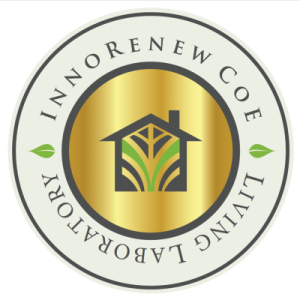InnoRenew CoE
Renewable Materials and Healthy Environments Research and Innovation Centre of Excellence
Renewable Materials and Healthy Environments Research and Innovation Centre of Excellence

Official Website of the Project: https://innorenew.eu/
The InnoRenew CoE project aims to establish a centre of excellence for research, development and innovation in the field of renewable materials and research on healthy living environments with a focus on wood. The acronym InnoRenew CoE is derived from the words Innovation (Inno; innovation), Renewable (Renew; renewable) and the Centre of Excellence (CoE; centre of Excellence): Renewable materials and healthy environments research and innovation centre of excellence (InnoRenew CoE).
Objectives
The main strategic objective and long-term vision of the InnoRenew CoE project is to capitalise on and upgrade the skills and knowledge of all the partners and relevant stakeholders involved in the project, thereby creating and/or improving innovative products, processes, services, business models and systems for a smart, sustainable and modern built environment for all generations, informing the public at all levels, thus contributing to the transformation of Slovenia into a society focused on sustainable development, cyclical economy, people’s well-being and the use of its renewable resources and assets.
The InnoRenew project also includes start-up projects that support the project’s main objective of establishing a sustainable research institute InnoRenew CoE: (1) Advanced materials for cultural heritage storage, (2) Evaluation of fire effluents with respect to ecotoxicity, (3) Development of formaldehyde-free fibreboards, (4) Building Information Modelling, (5) Innovative Connections for CLT Buildings, (6) Ergonomic, adaptable, and active office furniture, (7) Revitalisation of traditional industry: An open innovation framework for Slovenia’s furniture sector, (8) Materials for Energy Efficient Buildings.
NIJZ role: Review of the health impact assessment of materials in wooden buildings. The main activities of the NIJZ are:
Added Value
The aim of the project is to contribute to the further development of competences in the field of health impacts of new construction and other wood-based materials and to the further development of the professional field of a healthy built environment.
We also want to get international contacts and join a network of experts in the field of wood-based materials and healthy built environments.
In 2022, we participated in Work Package (WP) 5: WP 5.2 Educational programmes on healthy living/working environment for architects “Human health in the built environment” and in WP 7: Dissemination of project results. Within the framework of WP 5 we prepare educational materials for Health of People in Built Environment: A guide for architects and builders. In 2022, we also prepared a topic for applying to the CRP call, namely the preparation of a plan to assess the risks to human health from the release of volatile and semi-volatile organic compounds from materials into the indoor air. We attended remote project group meetings and various working meetings of individual sub-projects.
Key deliverables in 2022:
Project Duration: 1 April 2017–30 September 2023
Supporting Organisation: University of Primorska, Koper, Slovenia
Project partners: In the project, the University of Primorska has partnered with the Fraunhofer Institute for Wood Research – Wilhelm-Klauditz-Institut (WKI), which acts as a mentoring institution in the project because it is a top research and development institution and the transfer of innovation into industrial practice. Together with seven other Slovenian partners (the Construction Institute of Slovenia, the University of Maribor, the Institute for the Protection of Cultural Heritage of Slovenia, the Pulp and Paper Institute, the E-Oblak Institute, the National Institute of Public Health (NIJZ) and the Regional Development Agency of the Ljubljana Urban Region), the new centre of excellence is conducting research and development in the field of renewable materials and research on healthy living environments. The strategic objective of the operation is to enable Slovenia to break through the leading position in Europe in sustainable construction.
Funding: EU Framework Programme Horizon 2020 and the Republic of Slovenia